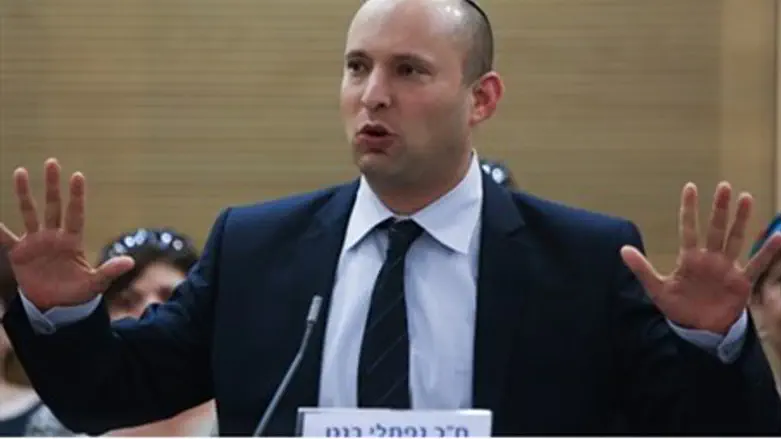
Economics Minister and Jewish Home (Bayit Yehudi) Chairman Naftali Bennett reflected on his party's accomplishments Monday during the weekly faction meeting.
"When the government was formed, the Jewish Home signed a coalition agreement," he began. "We demanded to add the referendum bill that helps unite the people and prevent Mitsubishi agreements, and [to add] the Nation-State Bill, which enshrines for generations to come the fact that Israel is a Jewish State."
The term "Mitsubishi agreements" refers to the Oslo Accords, which were made possible by the promise of a political position involving a Mitsubishi official car to a corrupt MK in exchange for his support - an under-the-table deal seen as symbolic of the undermining of the democratic process via corruption.
Bennett also referred to Sunday's landmark victory in pushing forward the "Life Without Parole" bill, which would severely limit the possibility of more large-scale terrorist releases.
"Moreover, we brought about a profound change in relation to release of terrorists," he said. "We stopped the fourth batch of terrorist releases and agreed to pay a price for our sitting in the [coalition] government if the batch went through [anyway], which did not happen."
Bennett then reflected on the present-day, rebuffing criticism leved against the coalition government for lacking direction.
"Today, a year after the establishment of the government, the situation is this: the Referendum Bill has passed into law, [and] MK Ayelet Shaked's law Nation-State Law has support from the Prime Minister, and I thank him for that," he said. "Yesterday we passed through the government, after a difficult struggle, the bill against releasing terrorists.
"This is the bottom line of the current government: there could be another speech, another project [. . .] they could call for a withdrawal, a disengagement, or a surrender - the bottom line is important: We will do, and anyone who wants to [merely] talk - [go ahead and] talk."
Sovereignty plans - and ignoring political mudslinging
The Economics Minister also pushed his sovereignty plan during the meeting, stressing that the time has come for a significant policy change regarding Judea and Samaria.
"In recent weeks I introduced the sovereignty program - a program which says for the first time what is good [or bad] for Israel, and what also can be done - not a program of intimidation but a program of taking initiative," he said.
"I'll say it again: He who runs away from terrorism - terrorism runs after him."
Bennett also lobbed critical comments against fellow ministers, several of whom slammed the sovereignty notion during Sunday's Herzliya Conference.
"I hear that the head of one party said yesterday that we hypnotize people around the settlements, the head of another party said that our plan is not a Zionist one, and the head of a third party said it was not feasible," he noted. "And to them, I say: You will continue to attack us and we will continue to do exactly what is best for the people of Israel and what we promised our voters."
Bennett's plan, as presented Sunday night, involves two distinct stages which will increase Israel's sovereignty over Judea and Samaria without introducing a Jewish minority.
Under the plan, Israel will gradually annex Area C of Judea and Samaria, where 400,000 Israelis reside alongside some 70,000 Arabs, while creating an enhanced autonomy in the remaining areas with full freedom of movement. The first area to be annexed would be Gush Etzion, an idea Bennett recently brought up during a speaking appearance at the Bar Ilan University.
The second part of the plan includes offering Israeli citizenship to 70,000 Arab residents living in the areas to be annexed, resulting in 1.77 million Israeli Arabs instead of 1.7 million today.
Bennett noted Monday that support for the plan appears to be building.
"We introduced the sovereignty program before the last election, and it has slowly garnered the support of ministers and several Likud MKs," he said. "According to the latest survey from the Israel Democracy Institute, the idea of sovereignty has received the support of 43% of the Israeli public - and it is is a program that cuts across political parties, gaining more and more ground."
"I introduced the program to the Prime Minister and the Cabinet, and even if it will not be implemented tomorrow, we are not afraid of a long journey [to get there]," he added.